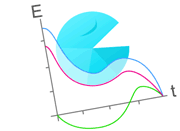A Slow PACE –It is important to note that, both before and after these therapies, the distances covered by the patient groups were only a little greater than 300 metres. Less than 300m, especially for people in this age group, would indicate something medically quite grim. When we consider progress beyond 300m, the gap between the performance of the patient groups and the low estimate for a healthy person really does underline the ineffectiveness of these therapies. Note that there are several studies measuring normal results for healthy adults: we used the lower values here.
As part of the original application (protocol) for a grant, the authors of the trial proposed that they would use actometers (pedometers) strapped to patients' ankles, and use the data as a baseline measure. This would have produced a better objective assessment of patients' true activity levels. After the trial had got under way, they decided that "a test that required participants to wear an actometer around their ankle for a week was too great a burden at the end of the trial." We do not understand that reasoning, especially as they decided to retain the six-minute walk assessment.
The PACE report itself concentrated on two of the subjective assessments: fatigue and physical function. With such a poor objective result on the 6-minute walk, and a failure to report on how many patients were able to "return to work", their weak overall results lack conviction. Near the end of the report the authors stated: "our finding that studied treatments were only moderately effective also suggests research into more effective treatments is needed. The effectiveness of behavioural treatments does not imply that the condition is psychological in nature". We would go further: in our view the extremely poor results of this trial showed rather that the ineffectiveness of these therapies demonstrates that the condition is not psychological in nature.
The Daily Mail, prompted by the briefing from the Science Media Centre, stated "scientists have found encouraging people with ME to push themselves to their limits gives the best hope of recovery". Did they even look at the results? Statements like this create widespread misunderstanding and difficulties for patients.
There can be only one conclusion drawn from the PACE study: there is no support for the proposition that a major factor holding back the recovery of patients with ME/CFS is psychological in nature. Therefore continuation of the automatic use of these therapies for all such patients should be halted. It must be remembered that CBT and GET are closely tied to assumptions about false illness beliefs and deconditioning, and as these are the only treatments on offer in the NHS, they colour people's perception of the illness. In reality, it would be entirely reasonable to suggest that these small improvements in test results could be caused simply through better illness management (including pain relief and improved sleep patterns).
The NICE guidelines state clearly that they do "not regard CBT or other behavioural therapies as curative or directed at the underlying disease process, which remains unknown. Rather, such interventions can help some patients cope with the condition and experience improved functioning, and consequently an improved quality of life".
Yet only very recently has the UK government begun to fund biomedical research into ME/CFS. The experience of patients both with the benefit system and with their medical care shows that the pervasive belief that the illness is primarily psychological in nature continues to be a major negative influence.
The PACE trial has cost in excess of £5 million. It has amassed a large amount of data, the likes of which we have not seen before for ME/CFS, nor are we likely to see such a similar size of study in the near future. So what lessons can we learn from it? How should we proceed? What should we do with the information that this trial contains?
These are the questions we asked ourselves as we looked deeper into one of the biggest treatment trials ever carried out for ME/CFS.
|



